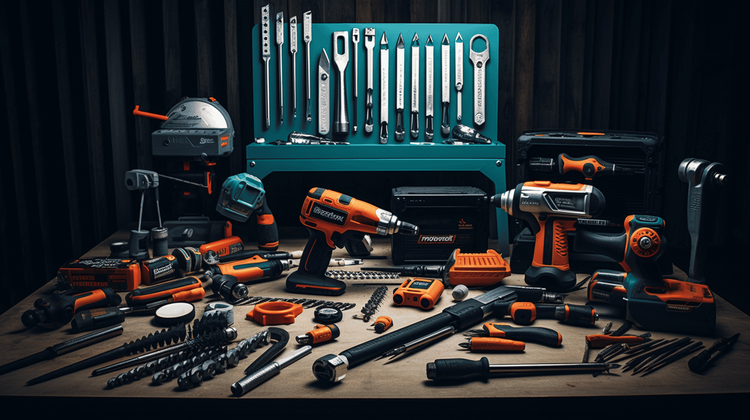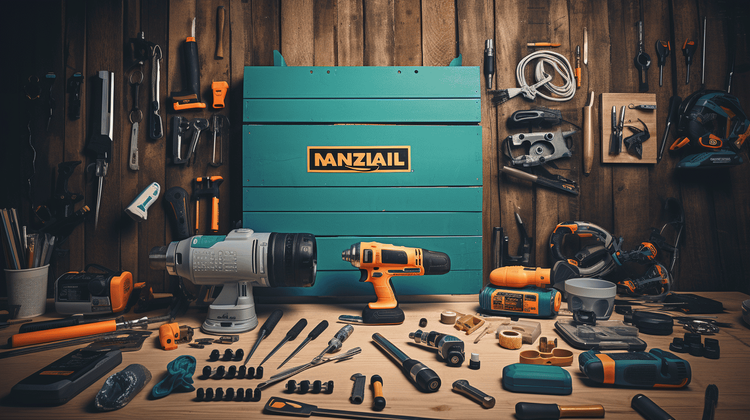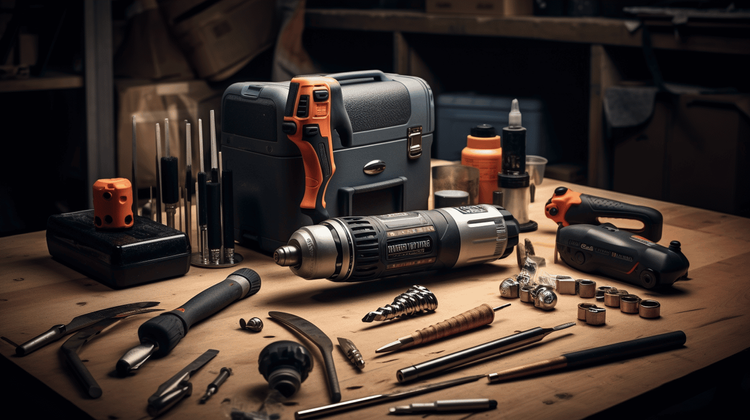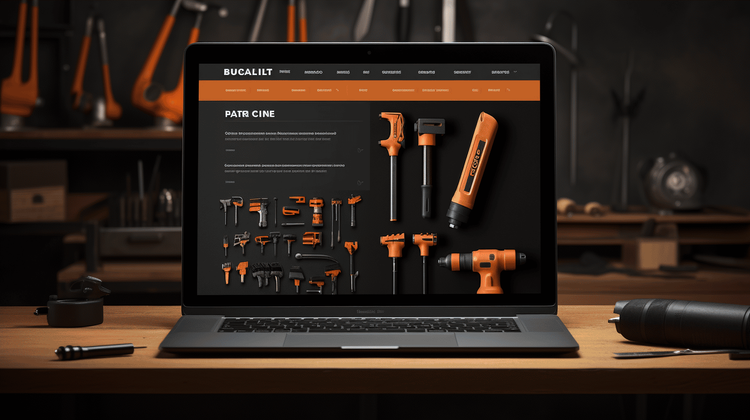DIY Projects Made Easy: How to Choose the Right Tools for the Job

Do you love tackling DIY projects around the house? Whether you're a seasoned DIY enthusiast or a newbie looking to start your first project, having the right tools is essential for success. Choosing the right tools can make your projects easier, more efficient, and even more enjoyable. But with so many options available, how do you know which tools are right for you?
In this article, we'll guide you through the process of selecting the perfect tools for your DIY projects. We'll cover everything from essential hand tools to power tools for efficiency and precision, specialized tools for specific projects, safety gear for protection, and much more.
By the end of this article, you'll have a better understanding of what tools you need to invest in and where to find them. So, let's get started and make DIY projects a breeze!
"The key to a successful DIY project is having the right tools at your disposal. With the right tools, you can tackle any project with confidence and achieve professional-quality results."
Understanding Your DIY Needs
When it comes to DIY projects, it's important to understand your specific needs before diving in. By identifying your project goals, assessing your skill level, and considering time and budget constraints, you can make sure you choose the right tools for the job. Let's take a closer look at each of these factors:
Identifying Your Project Goals
Before you start any DIY project, it's essential to have a clear understanding of what you want to achieve. Are you looking to make small repairs around the house, undertake a major renovation, or perhaps create a piece of furniture from scratch? Knowing your project goals will help you determine the type of tools you'll need.
Assessing Your Skill Level
Everyone has different levels of experience when it comes to DIY projects. It's essential to be honest with yourself about your skill level to ensure you choose tools that match your abilities. If you're a beginner, it's best to start with basic hand tools and gradually work your way up to power tools as you gain confidence.
Considering Time and Budget Constraints
Time and budget are two critical factors to consider when embarking on a DIY project. Think about how much time you can allocate to the project and set a realistic deadline for completion. Additionally, determine how much you're willing to spend on tools. While quality tools may come at a higher price, they often last longer and provide better results, so it's worth investing in durable and reliable equipment.
Now that you have a better understanding of your DIY needs let's move on to the next section, where we'll explore the essential hand tools every DIYer should have.
Essential Hand Tools for Every DIYer
When it comes to tackling DIY projects, having the right tools in your arsenal is essential. Whether you're hanging a picture frame, assembling furniture, or doing a small repair around the house, having a set of reliable hand tools is a must. These tools not only make your projects easier but also ensure that the end result looks professional. In this article, we'll explore the essential hand tools that every DIYer should have in their toolbox.
Hammer and Nails
A hammer is one of the most basic and versatile tools you'll need for any DIY project. From hanging pictures to driving in nails, a hammer is a must-have item. Look for a hammer with a comfortable grip and a solid weight that feels balanced in your hand. Additionally, it's a good idea to have a variety of nails on hand for different purposes, such as finishing nails or brad nails for small projects and heavier-duty nails for more substantial installations.
Screwdrivers and Screws
No DIY toolkit is complete without a set of screwdrivers. They come in different sizes and types, including flathead and Phillips head, to accommodate various types of screws. Having a set of both manual and electric screwdrivers is ideal for different projects. When it comes to screws, it's always useful to have an assortment of sizes and types, such as wood screws and machine screws, to ensure you have the right ones for your project.
Pliers and Wire Cutters
Pliers are a versatile tool that can come in handy for a wide range of DIY projects. Whether you need to tighten or loosen nuts and bolts, bend wire, or strip insulation from wires, a good set of pliers is a must-have. Wire cutters are another essential tool for any DIYer. They allow you to cut wires cleanly and precisely, making electrical work much easier and safer.
Measuring Tape and Level
Accurate measurements are crucial in DIY projects, which is why a measuring tape is an essential tool. Look for a tape measure that is sturdy, easy to read, and has a locking mechanism to hold the tape in place. A level is another important tool that ensures your projects are straight and even. Whether you're hanging shelves or installing cabinets, a level helps you achieve a professional-looking result.
With these essential hand tools in your toolbox, you'll be well-equipped to handle a wide range of DIY projects around the house. Additionally, investing in high-quality tools will ensure they last for years to come, saving you money in the long run. So, gather your tools, roll up your sleeves, and get ready to bring your DIY dreams to life!
Power Tools for Efficiency and Precision
When it comes to DIY projects, power tools can be your best friend. They offer increased efficiency and precision, allowing you to tackle tasks with ease and achieve professional-looking results. Whether you're a seasoned DIYer or just starting out, having the right power tools in your arsenal can make a world of difference. Here are some essential power tools that every DIY enthusiast should consider:
Cordless Drill
A cordless drill is a versatile tool that can handle a wide range of tasks, from drilling holes to driving screws. Its portability allows you to move freely around your workspace without being restricted by a power cord. Look for a drill that offers variable speed settings and a clutch mechanism, which allows you to control the depth of your screws.
Circular Saw
A circular saw is a must-have for any DIYer who needs to make accurate and clean cuts. Whether you're working on a woodworking project or need to trim down some materials, a circular saw can get the job done quickly and efficiently. Opt for a model with adjustable cutting depth and bevel options for maximum versatility.
Random Orbital Sander
Achieving a smooth and polished finish on your DIY projects is made easy with a random orbital sander. Unlike a regular sander, a random orbital sander moves in a circular and random motion, resulting in a swirl-free finish. Look for a sander with variable speed control and a dust collection system to keep your workspace clean.
Jigsaw
A jigsaw is perfect for making curved cuts and intricate designs. Whether you're working on a woodworking project or need to cut through different materials, a jigsaw can handle the task with ease. Look for a jigsaw with adjustable speed settings and orbital action, which reduces splintering and improves cutting efficiency.
Investing in high-quality power tools not only ensures better performance and durability but also guarantees your safety. Remember to follow these tips when choosing power tools for your DIY projects:
- Researching Reliable Brands: Look for reputable brands known for their quality and reliability. Check customer reviews and ratings to get an idea of the brand's reputation.
- Reading Product Reviews: Before making a purchase, read product reviews to learn about the experiences of other DIYers. Pay attention to any common issues or concerns mentioned in the reviews.
- Examining Warranty and Durability: Look for power tools that come with a warranty to protect your investment. Consider the durability of the tool and its ability to withstand regular use.
Remember, power tools can significantly enhance your DIY projects, but it's essential to use them safely. Always wear appropriate protective gear, such as safety glasses, ear protection, and work gloves. Familiarize yourself with the tool's instructions and safety guidelines before operating it.
Now that you have an idea of some essential power tools for efficiency and precision, it's time to take your DIY projects to the next level. Choose the tools that best suit your project needs and enjoy the satisfaction of completing your DIY tasks with ease and professionalism.
Specialized Tools for Specific DIY Projects
When it comes to tackling specific DIY projects, having the right specialized tools can make all the difference. These tools are designed to help you achieve more precise and professional results in a specific area of work. Whether you're painting walls, laying tiles, or working with wood, having the right tool for the job can save you time, effort, and frustration. Here are some essential specialized tools for specific DIY projects:
Paint Sprayer for Home Painting
If you have a painting project at home, whether it's repainting walls or giving furniture a fresh coat of paint, a paint sprayer can be a game-changer. Paint sprayers allow for a smooth and even application of paint, covering larger surfaces in a fraction of the time compared to using a brush or roller. They are also ideal for achieving a professional finish with minimal effort. Just be sure to follow the manufacturer's instructions and take proper safety precautions when using a paint sprayer.
Tile Saw for Flooring Projects
When it comes to installing tiles, a tile saw is an essential tool. This specialized tool allows you to make precise cuts on ceramic, porcelain, or stone tiles, ensuring a perfect fit for your flooring project. Whether you need to make straight cuts or custom shapes, a tile saw provides the accuracy and control you need to achieve professional-looking results. Remember to wear safety goggles and follow proper safety guidelines when operating a tile saw.
Router for Woodworking
If you enjoy woodworking projects, a router is a must-have tool. A router is a versatile tool that can be used to create decorative edges, joinery, and even carve intricate designs on wood. Whether you're building furniture or crafting small wooden objects, a router can help you achieve clean and precise cuts. With the right bits and accessories, you can unleash your creativity and take your woodworking projects to the next level.
Welding Machine for Metalwork
For those interested in metalworking projects, a welding machine is an indispensable tool. Whether you're repairing metal objects or creating new structures, a welding machine allows you to join metal pieces together securely. There are different types of welding machines available, such as MIG, TIG, and arc welders, each suited for specific types of projects. However, it's important to note that welding involves heat, sparks, and potentially harmful fumes, so proper safety precautions, such as wearing protective gear and working in a well-ventilated area, should always be taken.
Having the right specialized tools for your DIY projects can make a world of difference in terms of precision, efficiency, and overall results. Before investing in any specialized tool, consider the specific project you'll be working on and evaluate whether it's worth the investment. If you'll be using the tool frequently or have multiple projects in the same area, it may be more cost-effective to purchase the tool. However, if it's a one-time project or you won't be using the tool frequently, renting it from a local hardware store or tool rental center might be a more viable option.
Safety Gear for Protection
When it comes to DIY projects, safety should always be a top priority. Working with tools and materials can pose various risks, so it's crucial to have the right safety gear to protect yourself. Here are some essential safety gear items that every DIYer should have in their toolbox:
- Safety Glasses and Goggles: These will shield your eyes from flying debris, sparks, and harmful chemicals. Make sure to choose safety glasses or goggles that provide proper coverage and are made from impact-resistant materials. It's better to be safe than sorry!
- Ear Protection: Power tools can generate loud noises that can damage your hearing. Invest in a pair of earplugs or earmuffs to reduce the risk of hearing loss. Look for products with a high noise reduction rating (NRR) to effectively block out loud sounds.
- Dust Masks and Respirators: DIY projects that involve sanding, painting, or working with chemicals can release harmful dust particles and fumes. Protect your respiratory system by wearing a dust mask or respirator. Look for masks that are designed to filter out airborne particles and have a secure fit.
- Work Gloves: Your hands are valuable tools, so keep them protected with a pair of work gloves. Gloves provide an extra layer of protection against sharp objects, rough surfaces, and hot materials. Choose gloves that fit well and offer good dexterity to ensure you can still handle tools effectively.
Always remember that accidents can happen even with the best safety precautions in place. That's why it's crucial to have a well-stocked first aid kit readily available in case of any mishaps. Be prepared with basic medical supplies such as bandages, antiseptic ointment, and disposable gloves.
"Safety doesn't happen by accident. It's a conscious choice to protect yourself and those around you. Invest in the right safety gear and make it a priority in your DIY projects."
Choosing Quality Tools
When it comes to DIY projects, having the right tools is crucial for getting the job done efficiently and effectively. But with so many options available, how do you choose quality tools that will last? Here are some tips to help you make the right choice:
Researching Reliable Brands
One of the best ways to ensure you are investing in quality tools is by researching reliable brands. Look for brands that have a good reputation for producing durable and well-designed tools. These brands have often been in the industry for many years and have a track record of manufacturing products that withstand the test of time.
Reading Product Reviews
Product reviews can be a valuable source of information when it comes to choosing quality tools. Reading reviews from other DIYers who have used the tools you are interested in can give you insights into their performance, durability, and overall quality. Look for reviews from trusted sources, such as industry experts or reputable online retailers.
Pro Tip: Don't just rely on one or two reviews. Take the time to read multiple reviews to get a well-rounded perspective on the tool you are considering.
Examining Warranty and Durability
A warranty is a good indicator of a tool's quality. Reputable brands often have confidence in their products and offer warranties to back them up. A longer warranty period suggests that the manufacturer is willing to stand behind their product. Additionally, pay attention to the materials used in the construction of the tool. Look for tools that are made from durable materials such as steel or high-quality plastics.
Pro Tip: A tool with a solid construction and warranty not only ensures quality but can also save you money in the long run by eliminating the need for frequent replacements.
By taking the time to research reliable brands, reading product reviews, and examining warranty and durability, you can make informed decisions when it comes to choosing quality tools for your DIY projects. Remember, investing in quality tools is an investment in the success and longevity of your projects. So, choose wisely and enjoy the satisfaction of a job well done!
Renting vs. Buying Tools
When it comes to DIY projects, one of the biggest decisions you'll need to make is whether to rent or buy your tools. Both options have their pros and cons, and ultimately, the choice will depend on your specific needs and circumstances. Let's take a closer look at the factors you should consider when deciding between renting and buying tools.
Cost Analysis and Project Frequency
One of the first things to consider is the cost involved. Assess your budget and evaluate how often you plan to take on DIY projects. Here are a few things to keep in mind:
- Renting tools may be more cost-effective if you only need them for a one-time project or if you don't anticipate using them frequently.
- Buying tools can be a better long-term investment if you plan on tackling multiple projects over time. In this case, the cost of buying tools may be justified by the convenience and savings in the long run.
To make an informed decision, compare the cost of renting the tools you need for each project against the cost of purchasing them outright. Consider how often you'll use the tools and whether the frequency of use justifies the investment.
Tool Storage and Accessibility
Another factor to think about is where and how you'll store your tools. Here are a few points to consider:
- Renting tools saves you the hassle of storing them when you're not using them. This is especially beneficial if you have limited space available or if you're working on projects in different locations.
- If you have a dedicated workshop or storage area, owning your tools allows for easy access whenever you need them. You won't have to worry about rental shop hours or returning tools on time.
Think about your storage capacity and the convenience of having tools readily available. If storage space is limited or if you frequently work on projects away from home, renting tools might be the better option.
Considering Tool Maintenance
Maintaining tools is an essential part of keeping them in good working condition. When deciding between renting and buying tools, consider the following:
- Renting tools means you won't have to worry about maintenance or repairs. If the tool breaks or malfunctions, it's the rental company's responsibility to fix or replace it.
- On the other hand, owning tools requires you to take on the responsibility of maintaining them. This involves regular cleaning, lubricating, and storing them properly to maximize their lifespan.
Consider your willingness and ability to perform maintenance tasks. If you don't have the time or knowledge to maintain tools, renting might be a practical option for you. However, if you enjoy taking care of your tools and have the necessary skills, owning them can provide a sense of ownership and control over their condition.
Discussing the Pros and Cons
Here's a quick summary of the pros and cons of renting and buying tools:
| Renting Tools | Buying Tools |
|---|---|
| - Cost-effective for one-time projects | - Long-term cost savings for frequent projects |
| - No storage required | - Easy accessibility in a dedicated workspace |
| - No maintenance or repair responsibilities | - Personalized customization and modification options |
| - No need to worry about outdated tools | - Increased sense of ownership and control |
By weighing the advantages and disadvantages of each option, you can make an informed decision based on your DIY needs, budget, and storage capabilities.
Ultimately, both renting and buying tools have their merits. Consider your specific project requirements, budget, and long-term goals to determine which option is best for you. Whether you choose to rent or buy, having the right tools at your disposal will make your DIY projects more enjoyable and efficient. Happy DIYing!
Where to Buy Your Tools
Once you've decided on the tools you need for your DIY projects, the next step is to figure out where to buy them. Luckily, there are several options to choose from when it comes to purchasing tools. Here are some popular places where you can buy your tools:
1. Local Hardware Stores
Local hardware stores are a great place to start your tool shopping journey. These stores often have a wide selection of tools and equipment, ranging from basic hand tools to more specialized power tools. One of the advantages of shopping at a local hardware store is that you can get hands-on experience with the tools before making a purchase. You can examine the quality, weight, and feel of the tools to ensure they meet your requirements. Plus, the knowledgeable staff can provide expert advice and guidance based on their experience.
2. Home Improvement Centers
Home improvement centers, such as Home Depot or Lowe's, are popular destinations for buying tools. These stores offer a vast range of tools and equipment for all types of DIY projects. The advantage of shopping at home improvement centers is that they often have a wide variety of brands and models to choose from. You can compare different options side by side and make a more informed decision. Additionally, these centers often have additional services such as tool rental programs, which can be useful if you need a specialized tool for a one-time project.
3. Online Retailers
In this digital age, online retailers have become a go-to option for many shoppers. Buying tools online offers the convenience of browsing and comparing products from the comfort of your home. Online retailers typically have a wide selection of tools available at competitive prices. You can read reviews from other customers, which can help you make a more informed decision. Keep in mind that while online shopping is convenient, you may not have the opportunity to physically see or handle the tools before purchasing. Make sure to read the product descriptions and reviews thoroughly to ensure you're getting a reliable and high-quality tool.
No matter where you choose to buy your tools, it's important to consider a few key factors:
- Price: Compare prices across different stores or websites to ensure you're getting the best deal. However, keep in mind that quality should be your top priority. It's better to invest in a durable and reliable tool that will last you for years rather than buying a cheaper option that may break or wear out quickly.
- Customer Service: Look for stores or websites with excellent customer service. This can come in handy if you need assistance with your purchase, have questions about the tools, or need to return or exchange an item.
- Return Policy: Check the return policy of the store or website before making a purchase. It's always a good idea to have the option to return or exchange a tool if it doesn't meet your requirements or if you encounter any issues.
- Shipping and Delivery: If you're buying tools online, take into account the shipping and delivery options and costs. Some retailers offer free shipping, while others may charge a fee. Also, consider the estimated delivery time to ensure you receive your tools in a timely manner for your project.
Remember, the quality of your tools will directly impact the outcome of your DIY projects. It's worth investing in tools that are reliable, durable, and comfortable to use. Choose a reputable retailer that offers a wide selection of tools and provides good customer service.
Now that you know where to buy your tools, you're one step closer to embarking on your DIY projects with confidence and the right tools in your hand. Happy DIY-ing!
Conclusion
In conclusion, choosing the right tools for your DIY projects is essential for a successful and enjoyable experience. By understanding your project goals, assessing your skill level, and considering time and budget constraints, you can determine which tools are necessary for your specific needs.
Hand tools such as hammers, screwdrivers, pliers, and measuring tape are essential for every DIYer and can tackle a wide range of projects. Power tools like cordless drills, circular saws, random orbital sanders, and jigsaws offer efficiency and precision, making your work faster and more accurate.
For specialized projects, there are tools like paint sprayers for home painting, tile saws for flooring projects, routers for woodworking, and welding machines for metalwork. These tools cater to specific needs and can enhance the quality of your work.
When it comes to safety, don't forget to invest in safety gear like safety glasses, ear protection, dust masks, and work gloves. These will protect you from any potential hazards and ensure your well-being throughout the DIY process.
Choosing quality tools involves researching reliable brands, reading product reviews, and examining warranty and durability. This will help you invest in tools that will withstand the test of time and deliver excellent performance.
Deciding whether to rent or buy tools depends on factors like cost analysis, project frequency, and tool storage and accessibility. Renting tools may be more cost-effective for occasional use, while buying may be a better option for frequently used tools.
When it comes to purchasing tools, you have options like local hardware stores, home improvement centers, and online retailers. Consider factors like availability, price, and customer reviews to make the right choice for your needs.
By arming yourself with the right tools, you can tackle DIY projects with confidence and achieve professional-looking results. Remember to prioritize safety, invest in quality tools, and choose the best option for your needs.
So, are you ready to roll up your sleeves and start your next DIY project? Choose the tools that are right for you and unleash your creativity! Happy DIYing!
Frequently Asked Questions
- What factors should I consider when choosing tools for a DIY project?When choosing tools for a DIY project, consider factors such as the nature of the project, the materials you'll be working with, your skill level, and your budget. Additionally, think about the frequency of tool usage and whether it's worth investing in high-quality tools or renting them.
- Are there any essential tools that every DIYer should have?Yes, there are a few essential tools that every DIYer should have. These include a hammer, screwdrivers (both flathead and Phillips), pliers, tape measure, utility knife, wrenches, and a power drill. These tools will come in handy for a wide range of projects.
- Should I buy corded or cordless tools?The choice between corded and cordless tools depends on the project requirements and your personal preference. Corded tools generally provide more power and are ideal for heavy-duty tasks, but they require a nearby power source. Cordless tools offer convenience and portability but may have limited battery life and power.
- Do I need to buy expensive branded tools for DIY projects?Expensive branded tools often come with higher quality and durability, but they may not be necessary for all DIY projects. Evaluate your needs and choose tools that offer a good balance between quality and affordability. It's also worth considering borrowing or renting tools for one-time or infrequent projects.
- How can I learn to use tools properly for DIY projects?To learn how to use tools properly for DIY projects, you can refer to online tutorials, watch instructional videos, read user manuals, or even enroll in DIY workshops or classes. Practice is key, so start with simple projects and gradually increase the complexity as you gain more confidence and experience.




